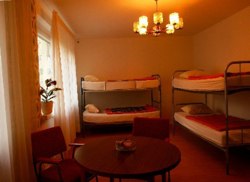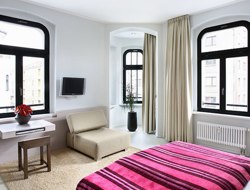
My personal travel kicked off when I started work for a luxury hotel booking site. Reviewing properties in the Travel Intelligence collection is part of my job, so I’ve stayed at a fair few amazing places that I could only dream of before. I do wonder, though: has my experience of new destinations (I bounced between TI hotels in Madrid, Copenhagen and New York last year) been altered by going luxury instead of sticking to hostels? How much in general are trips affected by where we stay? On a long weekend in Berlin last month, I got to find out.
My Berlin itinerary was split down the middle: for the first two nights, I’d booked myself in to a dorm at 15-EUR-per-night Ostel on the east side of the city. For the last two, I was to whizz to the centre of town for a stay at super-chic apartment hotel Lux Eleven, which was arranged in exchange for a review for my site. I was curious: would one show me a better time in Berlin than the other? Would the change in accommodation even make a difference?

Well, yes and no. Both places were faultless on cleanliness, transport links and service. I liked the coffee and the opulent shower at Lux Eleven, but then I also liked the camaraderie at Ostel, where our new dorm-mates gave us lifesaving city tips (most memorably, that the pool we were planning to visit was swimwear-optional. We chickened out in the end.)
The luxury option’s got to come out top, right? If not because it’s obviously my kind of thing then because, well, it’s luxury! It’s super-cosy, impossibly smart, prettier-than-your-own-home type accommodation – and above all else, you get a private room, which is already a notch ahead of hostelling. Yes, the difference in comfort is stark: at Ostel I slept in a bunk, at Lux Eleven, my comfy double faced a wall-mounted LCD TV, on which I watched MTV in bed.
And yet, and yet: this, and many other Lux Eleven touches, was a lovely extra but not a Berlin essential for me.
If I’d gone to Monaco or St Tropez, an all-the-trimmings kind of stay would make absolute sense – but Berlin’s different. Berlin is quite literally graffiti-and-broken-glass covered, of legendary nightlife and a grimily creative scene: clubs look like sets from Blade Runner, a walk down certain streets sees you pass squats and gaps of rubbly wasteland between buildings. I came to get a slice of this picture-perfect edginess, and it felt almost odd to go back to a plush pad after strolling the city.
Of course Berlin’s also got the historic architecture, fancy bars and designer boulevards to match any other European capital, and floating hither and thither between them from a smart hotel is can be a total joy. But it’s an option, rather than a given. The alternative scene is right on the surface here – you could very easily live by the night, and save the high life for your next trip.
Here’s what I think it boils down to: luxury hotels operate in their own fabulous bubbles, which is an amazing treat wherever they’re located. But with a hostel there’s no barriers – it’s as good as your own attitude towards it and the other people who are staying there. Hostelling in Berlin, you’re effectively taking the rough with the rough: but really, quite possibly, that’s how you might want it.









